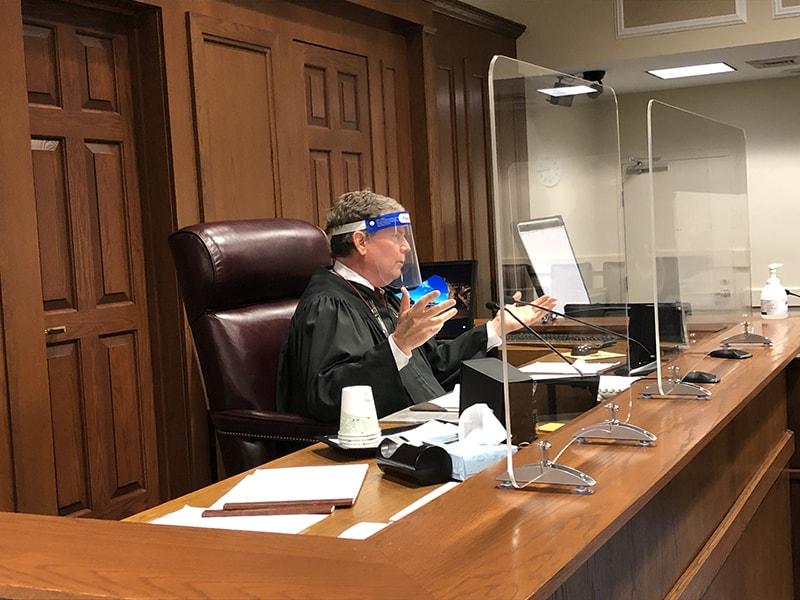
According to a press release, Washington courts proved during the pandemic they can adapt quickly to new technologies and methods when the need is urgent. In doing so, they also opened a door to building a more accessible and responsive court system.
That is a key conclusion of the Board for Judicial Administration’s Court Recovery Task Force. The Task Force issued its final report after two years of work coordinating emergency actions to keep courts operating safely. The report, “Re-Imagining Our Courts: Pandemic Response and Recovery Lead Courts Into the Future,” compiles the information gathered, the lessons learned, and the task force’s recommendations to the judicial branch on how to maintain the responsiveness and expanded access it forged out of necessity.
“We commit to not going back to business as usual, but instead to incorporate the important lessons we learned together,” wrote Washington Supreme Court Chief Justice Steven González in the report. Justice González served as co-chair of the Task Force with King County Superior Court Judge Judith Ramseyer and Olympia Municipal Court Judge Scott Ahlf.
Some common adaptations adopted during the pandemic included expanded electronic filing and use of electronic signatures, extensive use of remote video technology to conduct proceedings rather than requiring participants to appear in person, adjusting procedures to allow attorneys to take more actions for their clients, providing access to technology for those who lacked it, and much more. Many court rules permitting temporary measures are set to expire, but “a number of these emergency rules proved so effective they were recommended for permanent implementation,” according to the report.
The Task Force was convened in May 2020 by then-Chief Justice Debra Stephens to “share experiences and coordinate responses to the fluid and devastating situation we faced,” according to the report. Shortly after this, a racial justice movement surged nationwide in response to the killing of George Floyd, and Task Force members agreed that a racial justice lens should be used in considering responses and innovations. The Task Force also established Guiding Principles to guide their work and their recommendations.
Experts from throughout the courts, system partners, and community members were recruited to provide insight into needs and potential responses. These experts divided into 11 committees that created such tools as templates for virtual dependency proceedings, facility checklists for off-site safety, best practices for virtual discovery, alternative dispute resolution and pre-trial processes, a virtual court directory with online links to remote hearings, technology principles for the courts, best practices for court websites that are intuitive for users, and more.
In working together to transform court operations and services during the pandemic, “we used our experiences to overcome the daunting challenges we faced,” wrote the Task Force co-chairs in their introduction to the report. “Thankfully, this process also informed a blueprint for our courts to keep evolving into the most efficient, respectful, and just legal system we can become. As usual, from crisis comes opportunity.”
After sharing experiences, actions, and findings of the past two years, the Task Force recommended that courts of the future will:
- Embrace positive change;
- Communicate and collaborate with justice partners and local leaders, using the expanded input that led to many effective solutions during the pandemic;
- Use technology to promote access and efficiency – “Unquestionably, technological advancements offer access to courts and efficiencies never imagined when many Washington courthouses were constructed.”
- Gather feedback from court users, share findings, and use the information to adapt;
- Implement new practices and procedures through a racial justice lens;
- Prioritize the health, safety, and morale of the court work force;
- Plan for emergencies;
- Actively work with local and state governments to guarantee stable funding.
The Task Force also listed unfinished work that should be actively pursued such as addressing case backlogs, uniform access to technology for courts, universal broadband for court users, confronting and dismantling institutional racism, and gathering and disseminating meaningful data on use of essential court services.
My opinion? I’m proud that our Washington court systems pivoted so effectively. Still our access to justice is only as good as the means of access possessed by the people it serves. Zoom hearings were an excellent way to conduct court. Most courts pivoted to conducting motion and evidentiary hearings via Zoom. This platform allowed attorneys to teleconference for meetings, mediations and depositions.
However, actual court hearings via Zoom presented unique challenges. An estimated 42 million Americans live beyond the reach of broadband service. Also, older people may be unable or unwilling to master videoconferencing technology. Many criminal defendants are impoverished. They don’t have access to the internet. And many other defendants are illiterate or non-English speakers and cannot navigate these platforms.
Please contact my office if you, a friend or family member are charged with a crime. Hiring an effective and competent defense attorney is the first and best step toward justice.






